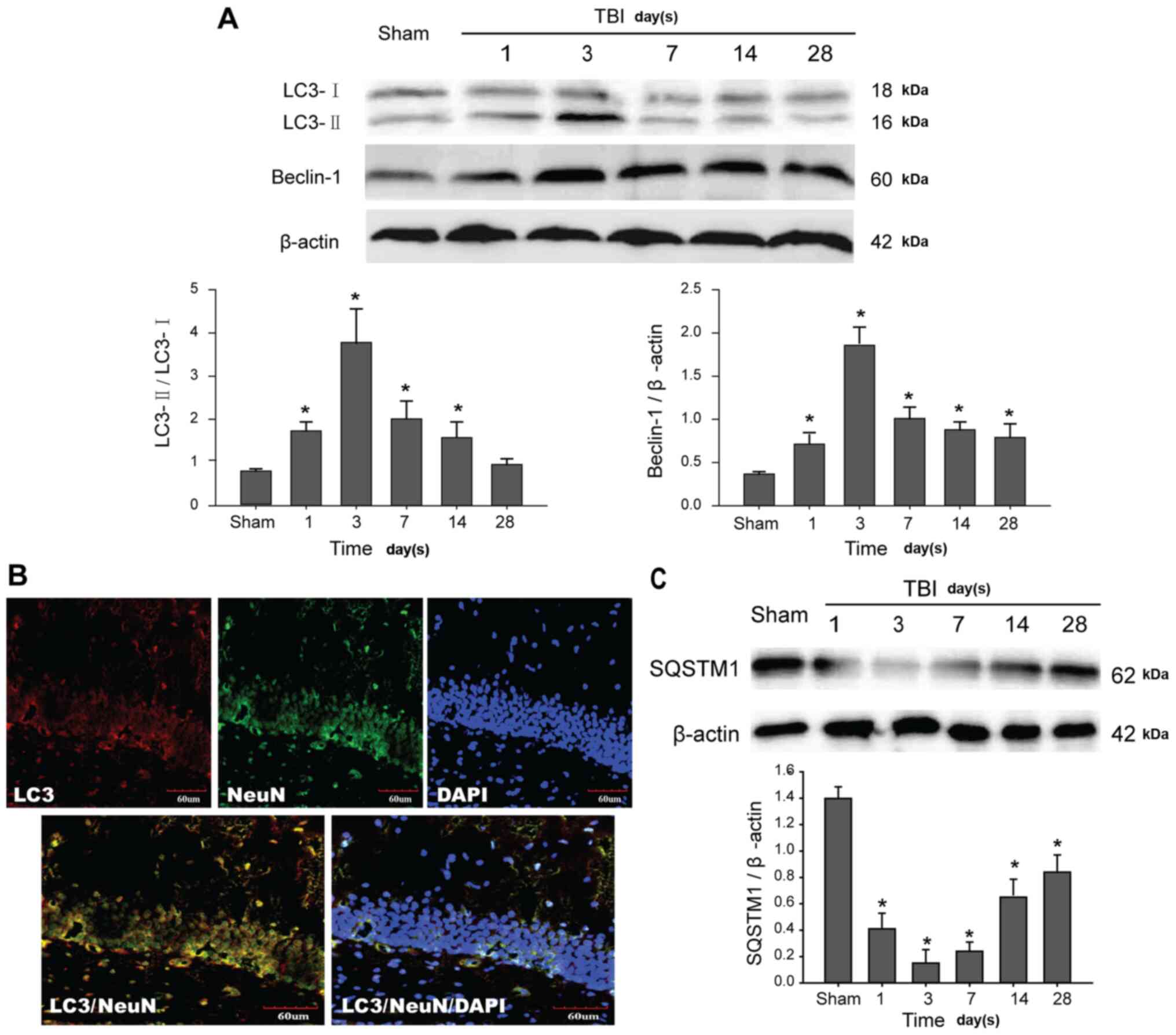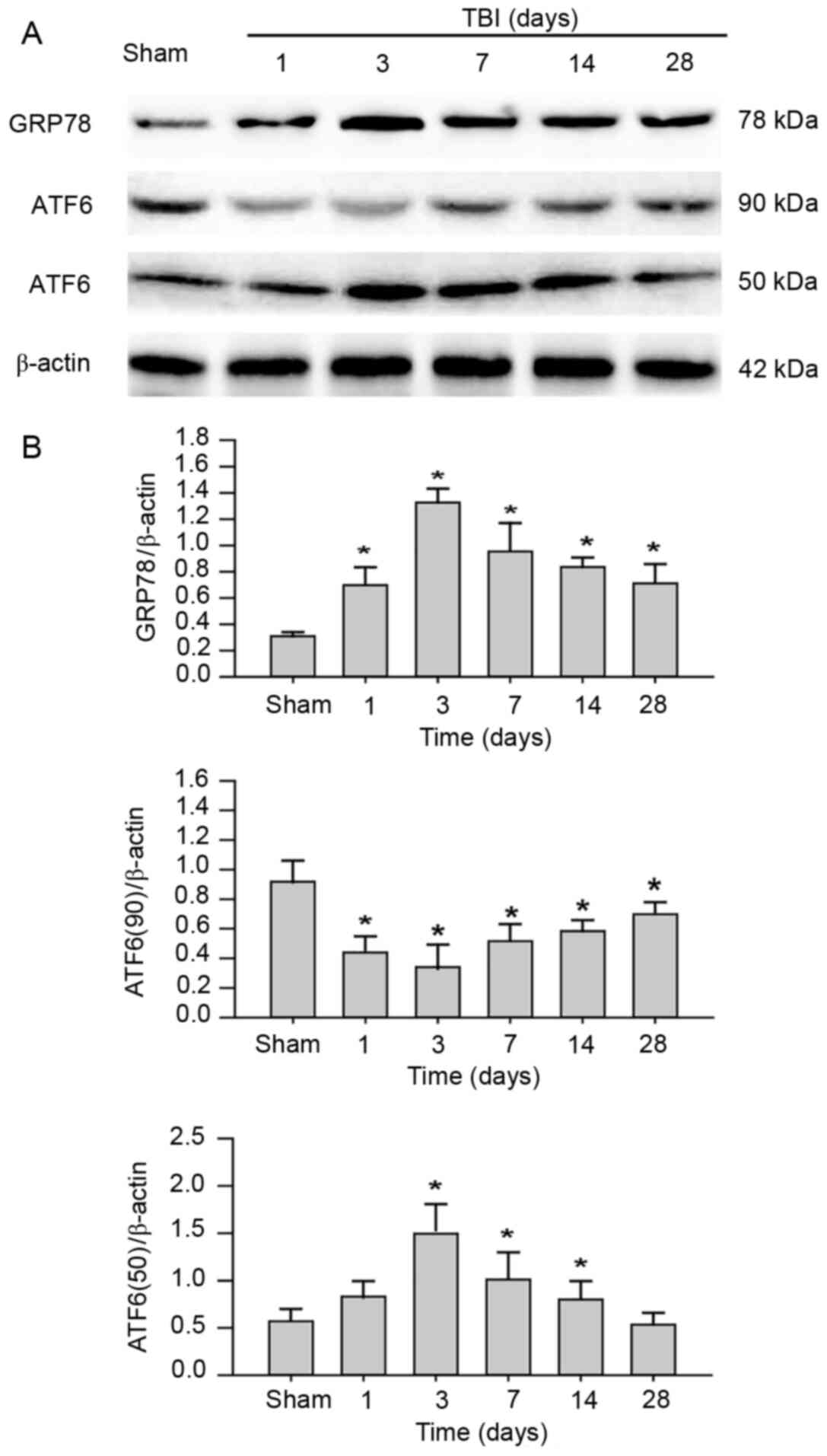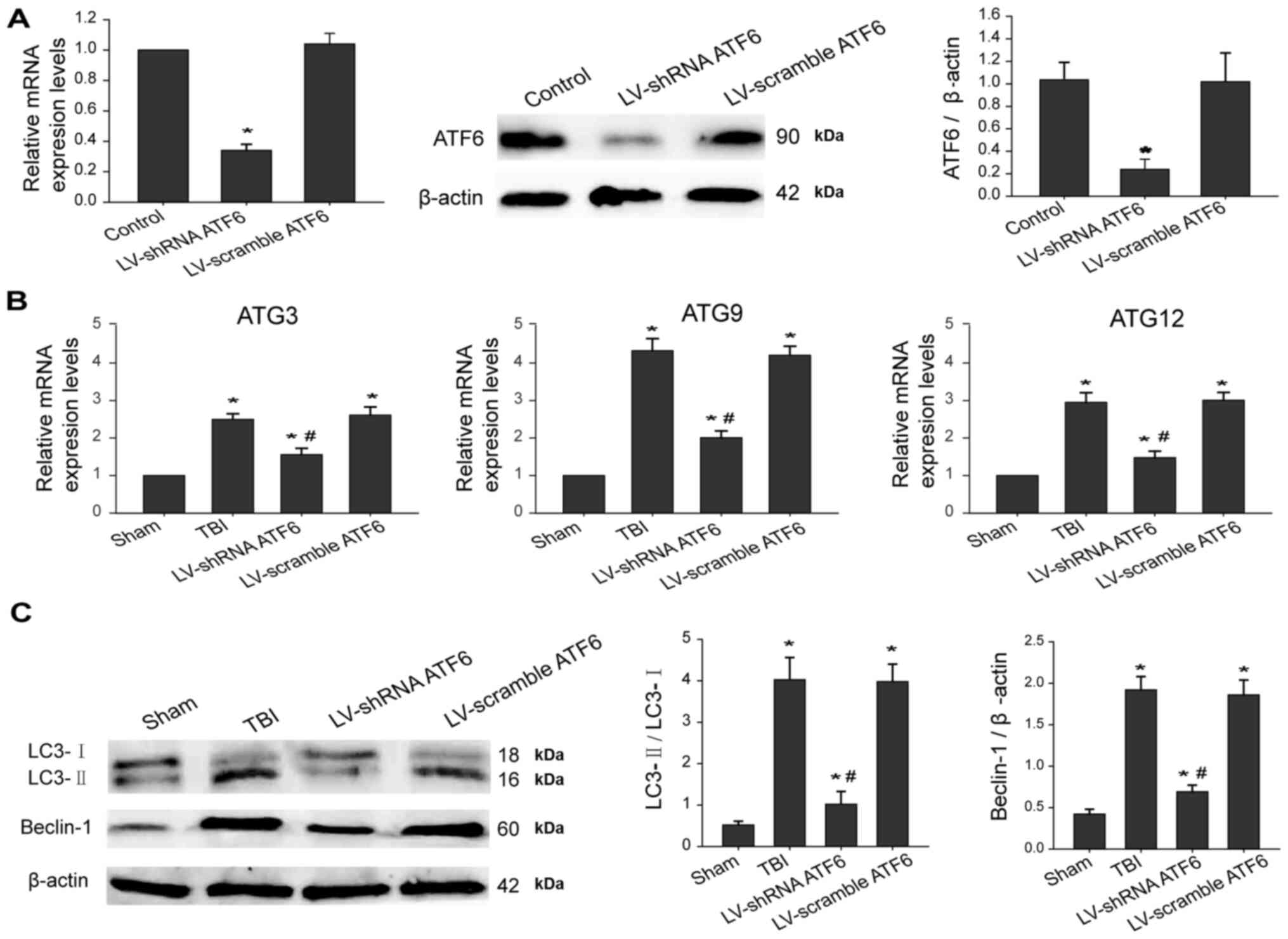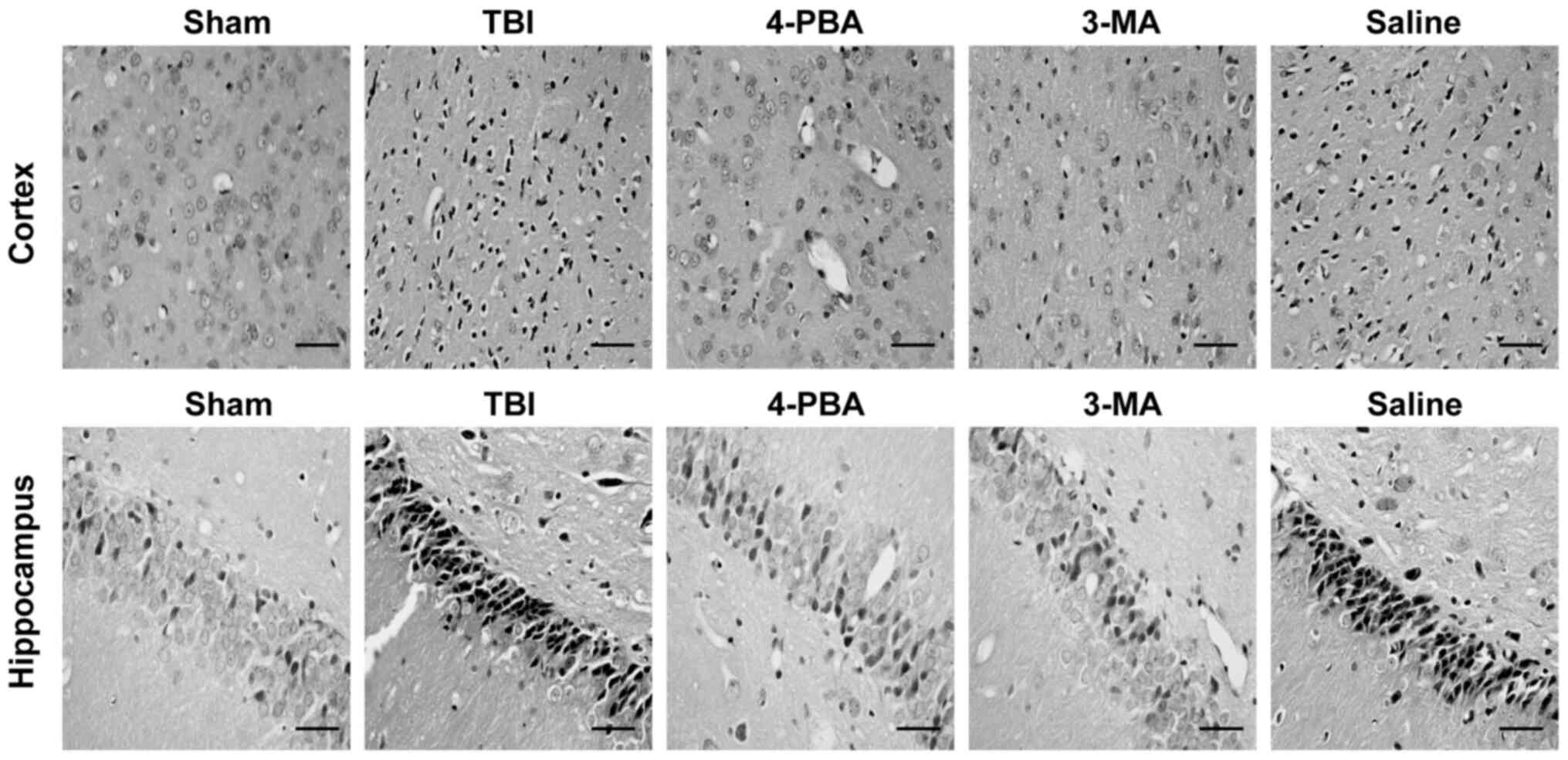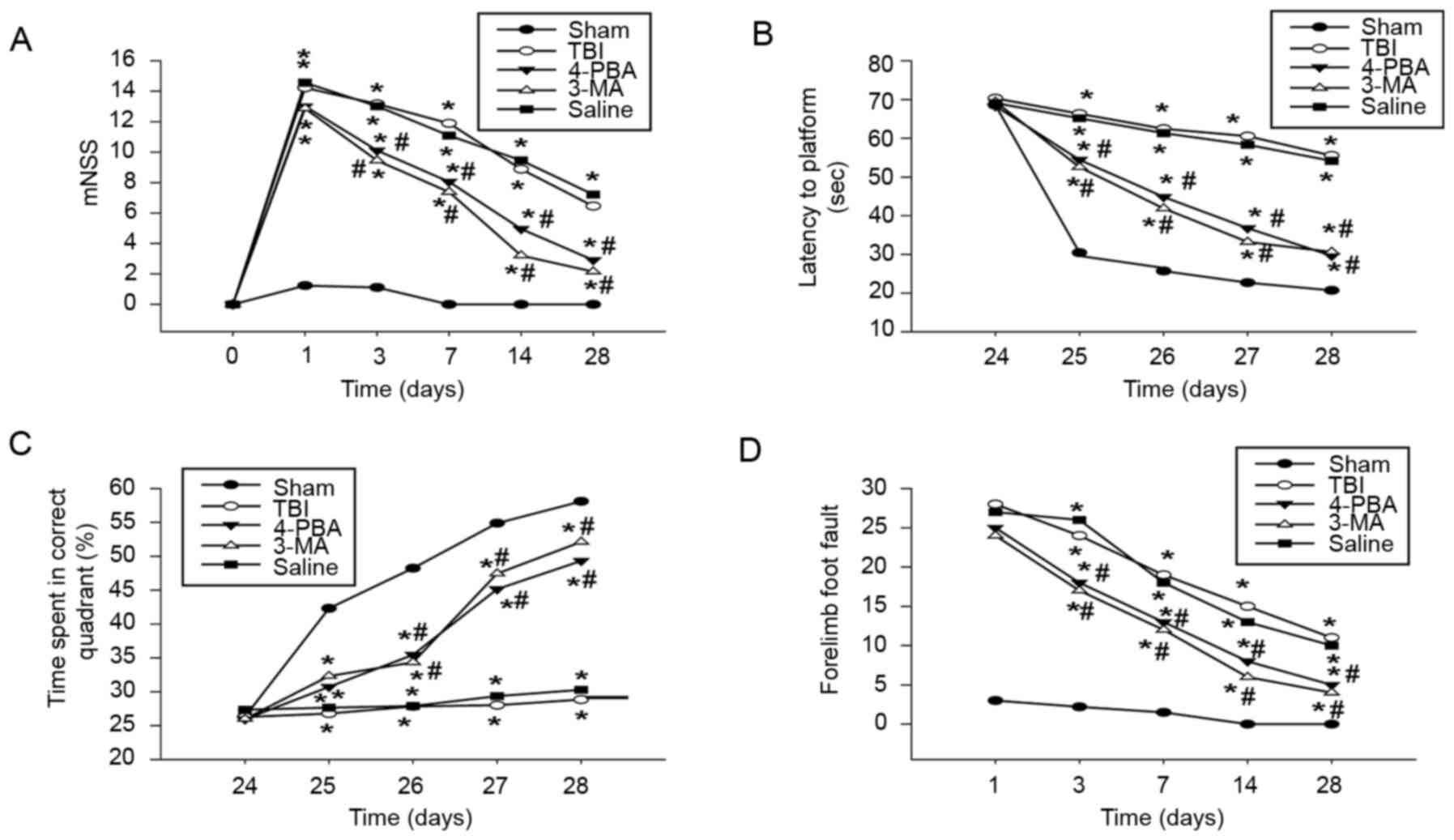|
1
|
Ng SY and Lee AYW: Traumatic Brain
Injuries: Pathophysiology and Potential Therapeutic Targets. Front
Cell Neurosci. 13:5282019. View Article : Google Scholar : PubMed/NCBI
|
|
2
|
Dewan MC, Rattani A, Gupta S, Baticulon
RE, Hung YC, Punchak M, Agrawal A, Adeleye AO, Shrime MG, Rubiano
AM, et al: Estimating the global incidence of traumatic brain
injury. J Neurosurg. 1:1–18. 2018.
|
|
3
|
Iaccarino C, Carretta A, Nicolosi F and
Morselli C: Epidemiology of severe traumatic brain injury. J
Neurosurg Sci. 62:535–541. 2018.PubMed/NCBI
|
|
4
|
Pavlovic D, Pekic S, Stojanovic M and
Popovic V: Traumatic brain injury: Neuropathological,
neurocognitive and neurobehavioral sequelae. Pituitary. 22:270–282.
2019. View Article : Google Scholar : PubMed/NCBI
|
|
5
|
Ling H, Hardy J and Zetterberg H:
Neurological consequences of traumatic brain injuries in sports.
Mol Cell Neurosci. 66:114–122. 2015. View Article : Google Scholar : PubMed/NCBI
|
|
6
|
Li D, Ni H, Rui Q, Gao R and Chen G:
Deletion of Mst1 attenuates neuronal loss and improves neurological
impairment in a rat model of traumatic brain injury. Brain Res.
1688:15–21. 2018. View Article : Google Scholar : PubMed/NCBI
|
|
7
|
Wilson L, Stewart W, Dams-O'Connor K,
Diaz-Arrastia R, Horton L, Menon DK and Polinder S: The chronic and
evolving neurological consequences of traumatic brain injury.
Lancet Neurol. 16:813–825. 2017. View Article : Google Scholar : PubMed/NCBI
|
|
8
|
Zhang Z, Miah M, Culbreth M and Aschner M:
Autophagy in neurodegenerative diseases and metal neurotoxicity.
Neurochem Res. 41:409–422. 2016. View Article : Google Scholar : PubMed/NCBI
|
|
9
|
Clark RS, Bayir H, Chu CT, Alber SM,
Kochanek PM and Watkins SC: Autophagy is increased in mice after
traumatic brain injury and is detectable in human brain after
trauma and critical illness. Autophagy. 4:88–90. 2008. View Article : Google Scholar : PubMed/NCBI
|
|
10
|
Wolf MS, Bayır H, Kochanek PM and Clark
RSB: The role of autophagy in acute brain injury: A state of flux?
Neurobiol Dis. 122:9–15. 2019. View Article : Google Scholar : PubMed/NCBI
|
|
11
|
Liu CL, Chen S, Dietrich D and Hu BR:
Changes in autophagy after traumatic brain injury. J Cereb Blood
Flow Metab. 28:674–683. 2008. View Article : Google Scholar : PubMed/NCBI
|
|
12
|
Jin Y, Wang R, Yang S, Zhang X and Dai J:
Role of microglia autophagy in microglia activation after traumatic
brain injury. World Neurosurg. 100:351–360. 2017. View Article : Google Scholar : PubMed/NCBI
|
|
13
|
Zeng Z, Zhang Y, Jiang W, He L and Qu H:
Modulation of autophagy in traumatic brain injury. J Cell Physiol.
235:1973–1985. 2020. View Article : Google Scholar : PubMed/NCBI
|
|
14
|
Li D, Huang S, Zhu J, Hu T, Han Z, Zhang
S, Zhao J, Chen F and Lei P: Exosomes from mir-21-5p-increased
neurons play a role in neuroprotection by suppressing
rab11a-mediated neuronal autophagy in vitro after traumatic brain
injury. Med Sci Monit. 25:1871–1885. 2019. View Article : Google Scholar : PubMed/NCBI
|
|
15
|
Feldmann LK, Le Prieult F, Felzen V, Thal
SC, Engelhard K, Behl C and Mittmann T: Proteasome and
autophagy-mediated impairment of late long-term potentiation
(l-LTP) after traumatic brain injury in the somatosensory cortex of
mice. Int J Mol Sci. 20:30482019. View Article : Google Scholar
|
|
16
|
Feng Y, Cui C, Liu X, Wu Q, Hu F, Zhang H,
Ma Z and Wang L: Protective role of apocynin via suppression of
neuronal autophagy and TLR4/NF-κB signaling pathway in a rat model
of traumatic brain injury. Neurochem Res. 42:3296–3309. 2017.
View Article : Google Scholar : PubMed/NCBI
|
|
17
|
Xu K, Wu F, Xu K, Li Z, Wei X, Lu Q, Jiang
T, Wu F, Xu X, Xiao J, et al: NaHS restores mitochondrial function
and inhibits autophagy by activating the PI3K/Akt/mTOR signalling
pathway to improve functional recovery after traumatic brain
injury. Chem Biol Interact. 286:96–105. 2018. View Article : Google Scholar : PubMed/NCBI
|
|
18
|
Cai Y, Arikkath J, Yang L, Guo ML,
Periyasamy P and Buch S: Interplay of endoplasmic reticulum stress
and autophagy in neurodegenerative disorders. Autophagy.
12:225–244. 2016. View Article : Google Scholar : PubMed/NCBI
|
|
19
|
Su Y and Li F: Endoplasmic reticulum
stress in brain ischemia. Int J Neurosci. 126:681–691. 2016.
View Article : Google Scholar : PubMed/NCBI
|
|
20
|
Rashid HO, Yadav RK, Kim HR and Chae HJ:
ER stress: Autophagy induction, inhibition and selection.
Autophagy. 11:1956–1977. 2015. View Article : Google Scholar : PubMed/NCBI
|
|
21
|
Zhang Q, Li Y, Liang T, Lu X, Zhang C, Liu
X, Jiang X, Martin RC, Cheng M and Cai L: ER stress and autophagy
dysfunction contribute to fatty liver in diabetic mice. Int J Biol
Sci. 11:559–568. 2015. View Article : Google Scholar : PubMed/NCBI
|
|
22
|
Hood KN, Zhao J, Redell JB, Hylin MJ,
Harris B, Perez A, Moore AN and Dash PK: Endoplasmic reticulum
stress contributes to the loss of newborn hippocampal neurons after
traumatic brain injury. J Neurosci. 38:2372–2384. 2018. View Article : Google Scholar : PubMed/NCBI
|
|
23
|
Hylin MJ, Holden RC, Smith AC, Logsdon AF,
Qaiser R and Lucke-Wold BP: Juvenile traumatic brain injury results
in cognitive deficits associated with impaired endoplasmic
reticulum stress and early tauopathy. Dev Neurosci. 40:175–188.
2018. View Article : Google Scholar : PubMed/NCBI
|
|
24
|
Yu Z, Sheng H, Liu S, Zhao S, Glembotski
CC, Warner DS, Paschen W and Yang W: Activation of the ATF6 branch
of the unfolded protein response in neurons improves stroke
outcome. J Cereb Blood Flow Metab. 37:1069–1079. 2017. View Article : Google Scholar : PubMed/NCBI
|
|
25
|
Adhami F, Schloemer A and Kuan CY: The
roles of autophagy in cerebral ischemia. Autophagy. 3:42–44. 2007.
View Article : Google Scholar : PubMed/NCBI
|
|
26
|
Yin Y, Sun G, Li E, Kiselyov K and Sun D:
ER stress and impaired autophagy flux in neuronal degeneration and
brain injury. Ageing Res Rev. 34:3–14. 2017. View Article : Google Scholar : PubMed/NCBI
|
|
27
|
Dixon CE, Clifton GL, Lighthall JW,
Yaghmai AA and Hayes RL: A controlled cortical impact model of
traumatic brain injury in the rat. J Neurosci Methods. 39:253–262.
1991. View Article : Google Scholar : PubMed/NCBI
|
|
28
|
Wang L, Wang X, Su H, Han Z, Yu H, Wang D,
Jiang R, Liu Z and Zhang J: Recombinant human erythropoietin
improves the neurofunctional recovery of rats following traumatic
brain injury via an increase in circulating endothelial progenitor
cells. Transl Stroke Res. 6:50–59. 2015. View Article : Google Scholar : PubMed/NCBI
|
|
29
|
Baskin YK, Dietrich WD and Green EJ: Two
effective behavioral tasks for evaluating sensorimotor dysfunction
following traumatic brain injury in mice. J Neurosci Methods.
129:87–93. 2003. View Article : Google Scholar : PubMed/NCBI
|
|
30
|
Livak KJ and Schmittgen TD: Analysis of
relative gene expression data using real-time quantitative PCR and
the 2(−Δ Δ C(T)) Method. Methods. 25:402–408. 2001. View Article : Google Scholar : PubMed/NCBI
|
|
31
|
Evans TD, Sergin I, Zhang X and Razani B:
Target acquired: Selective autophagy in cardiometabolic disease.
Sci Signal. 10:eaag22982017. View Article : Google Scholar : PubMed/NCBI
|
|
32
|
Li Z and Li Z: Glucose regulated protein
78: A critical link between tumor microenvironment and cancer
hallmarks. Biochim Biophys Acta. 1826:13–22. 2012.PubMed/NCBI
|
|
33
|
Sprenkle NT, Sims SG, Sánchez CL and
Meares GP: Endoplasmic reticulum stress and inflammation in the
central nervous system. Mol Neurodegener. 12:422017. View Article : Google Scholar : PubMed/NCBI
|
|
34
|
Shen J, Chen X, Hendershot L and Prywes R:
ER stress regulation of ATF6 localization by dissociation of
BiP/GRP78 binding and unmasking of Golgi localization signals. Dev
Cell. 3:99–111. 2002. View Article : Google Scholar : PubMed/NCBI
|
|
35
|
Whalen MJ, Carlos TM, Kochanek PM, Clark
RS, Heineman S, Schiding JK, Franicola D, Memarzadeh F, Lo W,
Marion DW, et al: Neutrophils do not mediate blood-brain barrier
permeability early after controlled cortical impact in rats. J
Neurotrauma. 16:583–594. 1999. View Article : Google Scholar : PubMed/NCBI
|
|
36
|
Sun L, Zhao M, Liu M, Su P, Zhang J, Li Y,
Yang X and Wu Z: Suppression of FoxO3a attenuates neurobehavioral
deficits after traumatic brain injury through inhibiting neuronal
autophagy. Behav Brain Res. 337:271–279. 2018. View Article : Google Scholar : PubMed/NCBI
|
|
37
|
Zeng XJ, Li P, Ning YL, Zhao Y, Peng Y,
Yang N, Zhao ZA, Chen JF and Zhou YG: Impaired autophagic flux is
associated with the severity of trauma and the role of
A2AR in brain cells after traumatic brain injury. Cell
Death Dis. 9:2522018. View Article : Google Scholar : PubMed/NCBI
|
|
38
|
Sun LQ, Gao JL, Cui CM, Cui Y, Jing XB,
Zhao MM, Wang YC, Tian YX, Wang KJ and Cui JZ: Astrocytic
p-connexin 43 regulates neuronal autophagy in the hippocampus
following traumatic brain injury in rats. Mol Med Rep. 9:77–82.
2014. View Article : Google Scholar : PubMed/NCBI
|
|
39
|
Zhao M, Liang F, Xu H, Yan W and Zhang J:
Methylene blue exerts a neuroprotective effect against traumatic
brain injury by promoting autophagy and inhibiting microglial
activation. Mol Med Rep. 13:13–20. 2016. View Article : Google Scholar : PubMed/NCBI
|
|
40
|
Komatsu M, Kageyama S and Ichimura Y:
p62/SQSTM1/A170: Physiology and pathology. Pharmacol Res.
66:457–462. 2012. View Article : Google Scholar : PubMed/NCBI
|
|
41
|
Gao Y, Zhang MY, Wang T, Fan YY, Yu LS, Ye
GH, Wang ZF, Gao C, Wang HC, Luo CL, et al: IL-33/ST2L Signaling
Provides Neuroprotection Through Inhibiting Autophagy, Endoplasmic
Reticulum Stress, and Apoptosis in a Mouse Model of Traumatic Brain
Injury. Front Cell Neurosci. 12:952018. View Article : Google Scholar : PubMed/NCBI
|
|
42
|
Wang CF, Zhao CC, He Y, Li ZY, Liu WL,
Huang XJ, Deng YF and Li WP: Mild hypothermia reduces endoplasmic
reticulum stress-induced apoptosis and improves neuronal functions
after severe traumatic brain injury. Brain Behav. 9:e012482019.
View Article : Google Scholar : PubMed/NCBI
|
|
43
|
Sun X, Zhang X, Zhai H, Zhang D and Ma S:
Chicoric acid (CA) induces autophagy in gastric cancer through
promoting endoplasmic reticulum (ER) stress regulated by AMPK.
Biomed Pharmacother. 118:1091442019. View Article : Google Scholar : PubMed/NCBI
|
|
44
|
Iurlaro R and Muñoz-Pinedo C: Cell death
induced by endoplasmic reticulum stress. FEBS J. 283:2640–2652.
2016. View Article : Google Scholar : PubMed/NCBI
|
|
45
|
Namba T, Ishihara T, Tanaka K, Hoshino T
and Mizushima T: Transcriptional activation of ATF6 by endoplasmic
reticulum stressors. Biochem Biophys Res Commun. 355:543–548. 2007.
View Article : Google Scholar : PubMed/NCBI
|
|
46
|
Sharma M, Bhattacharyya S, Sharma KB,
Chauhan S, Asthana S, Abdin MZ, Vrati S and Kalia M: Japanese
encephalitis virus activates autophagy through XBP1 and ATF6 ER
stress sensors in neuronal cells. J Gen Virol. 98:1027–1039. 2017.
View Article : Google Scholar : PubMed/NCBI
|
|
47
|
Sun X, Li W, Deng Y, Dong B, Sun Y, Xue Y
and Wang Y: Hepatic conditional knockout of ATF6 exacerbates liver
metabolic damage by repressing autophage through MTOR pathway.
Biochem Biophys Res Commun. 505:45–50. 2018. View Article : Google Scholar : PubMed/NCBI
|
|
48
|
Zhou Y, Zhang S, Dai C, Tang S, Yang X, Li
D, Zhao K and Xiao X: Quinocetone triggered ER stress-induced
autophagy via ATF6/DAPK1-modulated mAtg9a trafficking. Cell Biol
Toxicol. 32:141–152. 2016. View Article : Google Scholar : PubMed/NCBI
|
|
49
|
Wang J, Kang R, Huang H, Xi X, Wang B,
Wang J and Zhao Z: Hepatitis C virus core protein activates
autophagy through EIF2AK3 and ATF6 UPR pathway-mediated MAP1LC3B
and ATG12 expression. Autophagy. 10:766–784. 2014. View Article : Google Scholar : PubMed/NCBI
|















